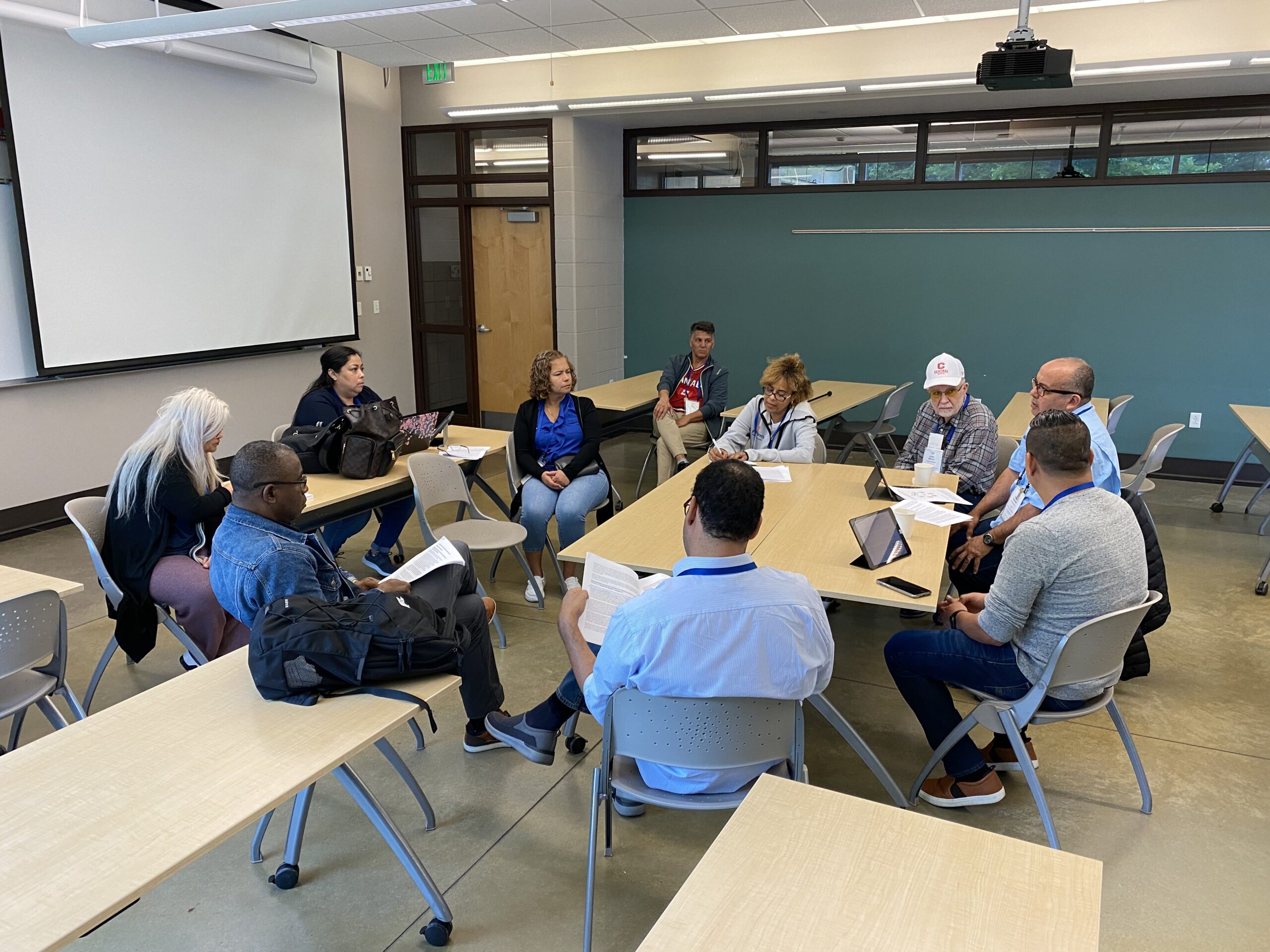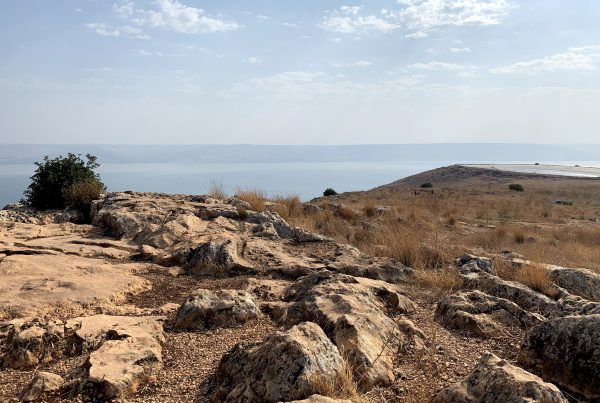In the restructuring team’s ongoing effort to keep the denomination informed and engaged in our work, we are sharing another update regarding the feedback received from the spring roundtable gatherings and the 2023 General Synod.
We are very grateful for the vast amount of thoughtful and insightful feedback that has been provided by the denomination throughout the restructuring process so far. We have taken significant steps to ensure that all feedback is included and valued. For instance, all handwritten feedback received at roundtable gatherings was collected and manually entered into our shared data by restructuring team members, Spanish feedback was translated to English, and correspondence sent directly to the restructuring team continues to be evaluated.
We are intentionally listening to the feedback we have received and listening to God’s voice in the midst. We are diligently striving to put systems in place to engage the denomination, to build momentum, and prepare us for a new envisioned future. This is the work of spiritual discernment, of discerning the mind of Jesus Christ together. We are in this discernment work together, not just as a team, but as a covenantal family of the RCA. Together, we will discern God’s will to shape the RCA’s future structure for mission and ministry.
In February 2023, the restructuring team shared a summary of the feedback from ten Zoom meetings held with classis and regional leaders the previous fall.
From January through May 2023, the restructuring team held 13 roundtable gatherings throughout the denomination in the U.S. and Canada, and one Zoom meeting for those who were unable to attend an in-person gathering. These events were hosted by many churches and New Brunswick Theological Seminary. The gatherings drew more than a thousand interested RCA church members and leaders to hear about the state of the RCA, learn about the progress of the restructuring team, engage in conversation and provide feedback.
At General Synod in June, the restructuring team presented draft proposals and asked for feedback from delegates. Delegates discussed the proposals in groups as well as at a special plenary session. Following synod, their feedback was analyzed to help the restructuring team continue to build on and refine its draft proposals.
Now that the roundtable gatherings and 2023 General Synod have concluded and the feedback analyzed, we can share a summary of the themes the feedback represented.
We are thankful for all who participated in the roundtable gatherings and 2023 General Synod feedback groups and contributed their feedback. The feedback is shaping the restructuring team’s work and will contribute to the refinement of the restructuring team’s final proposals to be presented at the 2024 General Synod.
We invite you to remain informed and engaged in the restructuring process as we all seek God’s will for the RCA and the structure that will support it. Our team asks for your prayers as we continue our work. For all updates about the restructuring team process, visit www.rca.org/restructuringteam. If you wish to communicate with the restructuring team, please email restructuringteam@rca.org.
May God bless you,
The Restructuring Team
Eddy Alemán
Dale Assink
Greg Brower
Michelle Chahine
Chad Farrand
Andrea Godwin-Stremler
Sung Kim
Micah McCreary
Sherri Meyer-Veen
Ina Montoya
Young Na
Andres Serrano
Gildo Vieira
Feedback from spring roundtable gatherings
This is a summary of the feedback we received in the spring roundtable gatherings, held in 13 locations across the RCA and on one Zoom call. This feedback was gathered in response to key questions.
What structures are needed to effectively produce disciples of Jesus Christ?
Themes:
Local Church Focal Point | Equipping Clergy and Laity | Relationship Building | Flexible and Contextual Structures | Healthy Accountability | Embrace Diversity | More Collaboration
Summary:
There is consensus that disciple-making happens best at the local level through healthy congregations and ministries. The focus should be on equipping people in their faith and bringing them together in Christ-centered communities, rather than rigid or top-down institutional mandates. It is vital that support structures are needed to provide accountability, connect churches in their region, foster clergy and laity development, and share resources, while remaining flexible and promoting diversity.
What about this presentation gives you hope?
Themes:
Discipleship Focus | Embraces Diversity | Adaptable to Change and Context | Empowers Local Church and Ministries | Streamlines Structure | Maintains Reformed Theology and Identity
Summary:
There is a mix of hopefulness and skepticism. Many respond positively to the principles outlined, such as focusing on discipleship, diversity, and locality. They appreciate steps toward inclusivity, efficiency, and decentralization. However, some are doubtful real change will occur or want more specifics before feeling hopeful. Others caution against too much change. Overall, there seems to be an openness to reimagine how the RCA functions, with an emphasis on supporting ministry at the local level. While responses vary, most want to see the RCA actively carry out its mission of transforming lives and communities through the gospel of Jesus Christ.
What about this presentation gives you pause?
Themes:
Human Sexuality Issue not Addressed | Reformed Distinctives Unclear | Clarity Needed on Proposed Structures | De-centralized Denomination Concerns | Discipleship Definition Needed | Change Management
Summary:
Overall, the proposals are seen as a step in the right direction by some, while others have uncertainties about the details and impacts. There is hope the changes can renew the RCA’s missional focus, but also concerns about maintaining theological coherence and accountability. Patience, open communication, and trusting God through an extended season of change will be key.
What are you willing to do to help accomplish this future?
Themes:
Strong Prayer Commitment | Desire to Remain Engaged | Willingness to Broadly Promote and Communicate the Restructuring Vision | Commitment to Local Congregations and Ministries | Willingness to Volunteer and Share Skills and Giftings | Support Change Constructively
Summary:
Overall, there is clearly a deep love for the RCA and commitment to its faithful future, paired with some uncertainty about what exactly it will look like. There is openness to change but desire for clarity. The spirit is willing but the details are pending. Patience, prayer, faith in God’s provision, and continuing the work of disciple-making seem paramount.
Feedback from General Synod
This is a summary of the feedback we received from the 2023 General Synod Feedback Groups, in response to key questions. Read the draft proposals the feedback groups were responding to.
Proposal 1 Part A: Resource Centers and Clusters
What resonated with you?
Themes:
Streamlining and Consolidation | Local Autonomy and Flexibility | Support and Relationship Building | Efficiency and Accessibility | Greater Connection and Communication | Cultural Interaction
Summary:
There is optimism and excitement for the proposed changes, with many viewing it as an opportunity to better resource local congregations, foster stronger connections, and streamline operations. It is seen as a step toward modernization, allowing for greater flexibility, adaptability, and inclusivity. However, some caution was noted regarding the need to handle the transition thoughtfully, to avoid any confusion or disruption. There were also mentions of the need to maintain a Christ-like demeanor through the changes and to consider the varying needs and resources of different congregations. The shift toward a more globally minded denomination was seen as an exciting prospect. The new structure was perceived as being more attuned to the changing needs of the church and its congregations, and more conducive to fostering relationships and mutual support.
What concerns or questions do you have?
Themes:
Structural and Governance Concerns | Global vs. Local Tensions | Financial and Logistical Concerns | Communication and Engagement | Theological and Identity Concerns
Summary:
There is a general feeling of uncertainty about the implications of a more global structure and its impact on local congregations and the traditional functions of the church. The changes are seen by some as a shift toward a more corporate model, and there are significant concerns about how governance and accountability will work under the new system. There’s a clear desire for more detailed information, clarification, and reassurance about many aspects of proposed changes.
Proposal 1 Part B: Global Leadership Council
What resonates with you?
Themes:
Global Perspective and Diversity | Cost and Frequency of Meetings | Representation and Participation | Opportunities for Growth and Sharing | Local Autonomy and Decentralization
Summary:
The delegates appreciate the shift toward a more global, diverse representation in the RCA, as it not only reflects the changing demographics of the congregations but also aligns with the mission to reach out across the globe. There is broad approval for the reduction in frequency of the costly General Synod meeting, with delegates supporting the financial savings this would provide. Participants seem excited about the potential growth and the opportunity to learn from and share with global churches. The new structure, emphasizing local autonomy and a shift from policy to worship and relationship-building, is welcomed as a revitalizing and life-giving change for the denomination.
What concerns or questions do you have?
Themes:
Legal and Organizational Implications | Fear of Colonialism and Domination | Reduced Frequency of Meetings | Balance of Power and Representation | Corporate vs. Theological Focus | Past Mistake and Future Direction | Transparency and Accountability | Financial Implications
Summary:
The proposed changes to the RCA’s structure, particularly the introduction of the Global Leadership Council, have been met with mixed reactions. While there is excitement about the opportunities presented by global expansion, this is tempered by concerns about potential imbalances of power, the lack of transparency, and financial implications. Delegates have expressed fear that this shift could repeat past mistakes and lead to cultural domination. There is a clear desire for more information and greater clarity regarding the roles and responsibilities of the Global Leadership Council, as well as assurance that a fair balance of power and representation will be maintained.
Proposal 2: More Frequent Local Gatherings/Less Frequent Global Gatherings
What resonates with you?
Themes:
Local Accessibility and Frequency | Cost and Resource Efficiency | Consensus Building and Unified Voice | Balance Between Business and Fellowship | Role of Technology
Summary:
Participants express a preference for more locally focused and frequent meetings, seeing them as more convenient and better suited to addressing specific local needs. They appreciate the potential for cost savings and better resource allocation that comes with less frequent global meetings. The consensus model of decision-making is valued for its ability to foster unity, and there’s a desire for a balance between business and fellowship at meetings. Finally, there’s an acknowledgement of the role that technology could play in facilitating communication and possibly even coordinating regional and global gatherings.
What concerns or questions do you have?
Themes:
Representation and Inclusion | Role of Assemblies and Gatherings | Organizational Shifts and Trust | Costs and Resources | Historical and Theological Considerations
Summary:
While participants acknowledge the potential benefits of the proposed changes, they also have significant concerns. Regarding representation and inclusion, participants have concerns about who will be included in future meetings, especially at the global level. This involves questions about who decides who attends and how financial barriers can be mitigated. There’s also concern about how the shift of responsibilities from the Global Leadership Council to local groups could affect inclusion. The potential exclusion of geographically isolated groups or individuals is a particular worry. Participants also express concerns about changes to the nature and function of assemblies, potential organizational shifts, and issues of trust, as well as cost and resource implications. They also express fears about the potential impacts on the denomination’s history and theology. Delegates have numerous questions that need addressing to alleviate these concerns.
Proposal 3: Biblically Based System for Accountability and Discipline
What resonates with you?
Themes:
Resonance with the Current Model | Support for Local Accountability | Favor Toward Mediation | Scriptural Foundation | Restorative Justice | Ease of Understanding
Summary:
Delegates appreciated the proposed move toward local accountability, mediation, and restorative justice, all framed within a scripturally based system. However, concerns were raised regarding the practical implementation of these ideas, with some expressing that the proposal might not be very different from the existing system. The delegates appear open to the possibility of changes but are also wary of unforeseen challenges in execution.
What concerns or questions do you have?
Themes:
Choice of Biblical Model | Local vs. Central Control | Effectiveness and Practicality | Clarity and Detail | Speed of Changes | Cultural and Diversity Considerations | Potential for Abuse
Summary:
Delegates expressed a need for more clarity and specificity concerning how discipline would function, the roles of different parties in the new structure, and the appropriateness of the Matthew 18 model for all situations. There was concern about the speed at which these changes were being proposed, especially given recent significant loss within the denomination. Questions arose whether accountability and discipline would vary between different cultures or clusters, and how these differences would be handled. There’s a sense that while reform might be necessary, there needs to be careful consideration of the potential outcomes and consequences of these changes.
For a full overview of the responsibility of this team and for past updates, visit the restructuring team webpage.





